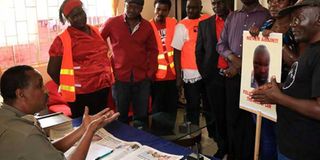Candidates should commit to addressing abuses

Kondele OCS Mr Mohammed Baa addresses a section of Kisumu Residents who stormed his office in protest of police brutality on August 4, 2016. PHOTO | TONNY OMONDI | NATION MEDIA GROUP
What you need to know:
- The electorate deserve is a clear outline of how they plan to tackle the culture of impunity of the security forces that has caused and continues to cause devastating harm to so many Kenyans.
- Under the Jubilee administration, the security forces have continued a pattern of targeting Kenya’s Somali and Muslim communities in abusive, discriminatory counter-terrorism operations.
- On July 3, Kenyan media reported that five bodies, including a woman’s, had been uncovered in the north-eastern county of Mandera.
Kenya will be holding its General Election on August 8 and the campaign is at its peak.
Considering the gravity of security force abuses, justice and accountability should feature prominently in the candidates’ electoral commitments, including the President’s.
But so far, we’ve only heard deafening silence.
What the electorate deserve is a clear outline of how candidates plan to tackle the culture of impunity of the security forces that has caused and continues to cause devastating harm to so many Kenyans.
Under the Jubilee administration, the security forces have continued a pattern of repeatedly targeting Kenya’s Somali and Muslim communities in abusive, discriminatory counter-terrorism operations, presumably in response to ongoing attacks by the armed Islamist group, al-Shabaab.
EXTRA-JUDICIAL KILLINGS
Yet when President Uhuru Kenyatta met with representatives of the Muslim community on May 23, he appeared to brush off those concerns.
According to a video clip circulated soon after the meeting, the President appeared to deny the security forces’ involvement in extra-judicial killings and disappearances, while offering a vague apology on behalf of all previous Kenyan governments for the wrongs committed against those he described only as “some Kenyans.”
In the meantime, the abuses and cycles of impunity persist.
On July 3, Kenyan media reported that five bodies, including a woman’s, had been uncovered in the north-eastern county of Mandera.
Relatives who spoke to Human Rights Watch by phone said that the five were last seen being taken into custody of people who had introduced themselves as officers from the Anti-Terrorism Police Unit (ATPU). The ATPU officers were, the relatives alleged, accompanied by military officers from the Kenyan Defence Forces Mandera base.
INVESTIGATIONS
Police later said they have opened investigations into the incident, but investigations into similar incidents in the past have not led to accountability.
In recognition of this grim – and repetitive – reality, local and international human rights organisations, including Human Rights Watch, wrote to President Kenyatta last December urging him to create a special commission of inquiry to investigate killings and enforced disappearances by security agencies.
Information gathered by Human Rights Watch about the five bodies discovered in Mandera suggests a pattern similar to cases we documented in the 2016 report about security forces abuses during operations in Nairobi and the northeast.
The report documented at least 11 cases of people last seen in State custody and later found dead.
TERRORISM
Abuses like these are not confined to parts of Kenya most affected by counter-terrorism operations or significant insecurity.
They also occur right at the heart of the poorest areas of Nairobi.
On May 30, Mathare Social Justice Centre, a Nairobi-based human rights organisation, released a report detailing at least 57 cases of police killings of young men and women in Nairobi’s low-income areas over the past three years.
The patterns are similar to what I have documented in north-eastern Kenya and in Nairobi’s Eastleigh area over the years.
Victims are picked up by officers who are well known to residents or relatives of the victim and later bodies are discovered either in the vicinity or many miles away.
THREATS
Soon after their report was published, members of Mathare Social Justice Centre reported that at least two of their colleagues had faced threats.
The police have also twice arbitrarily arrested one staff member and detained him for hours.
Kenyan authorities have an obligation to ensure that families and victims of security force abuses, whether in Nairobi or in the northeast, get justice and that any threats against activists working to ensure justice are adequately investigated.
The tragic June 2016 killing of the human rights lawyer Willie Kimani, his client and their cab driver stands as a rare example of prosecutorial efforts at justice for police abuses.
Four police officers are currently facing charges relating to the killing of the three.
IMPUNITY
This case should catalyse a renewed effort to root out impunity among Kenya’s security forces and ensure justice for victims and their families.
President Kenyatta has yet to respond to last year’s call by human rights groups for a special commission of inquiry into security forces abuses.
Reports of killings and other abuses by police continue to be widespread across the country.
This is the time for all presidential candidates to commit to justice and to re-establish trust in the security forces.
The candidates’ clear commitment to establishing a special commission of inquiry to investigate these abuses is needed more than ever.
Namwaya is an Africa researcher at Human Rights Watch




